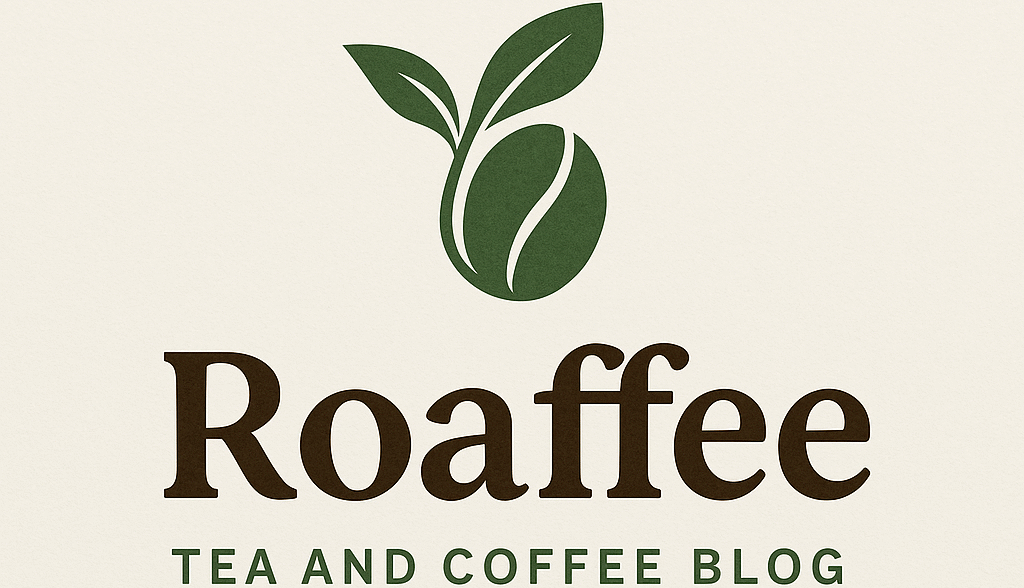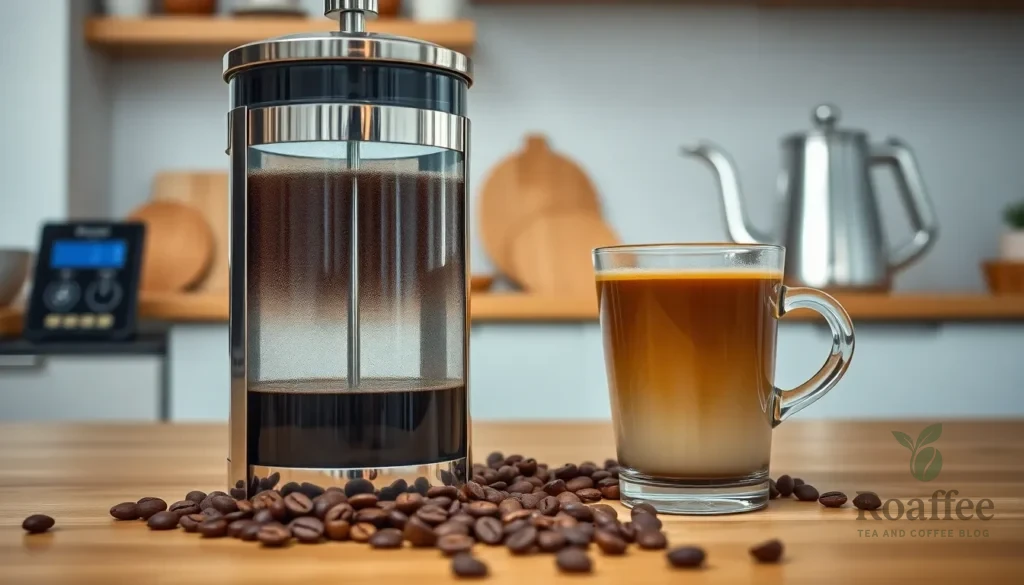There’s something magical about brewing the perfect cup of French press coffee at home. We’ve all been there – standing in line at expensive coffee shops wondering if we could recreate that rich, full-bodied flavor in our own kitchen. The truth is, we absolutely can, and it’s easier than you might think.
French press coffee, also known as a cafetière or press pot, delivers one of the most satisfying coffee experiences you’ll ever have. Unlike drip coffee makers that filter out essential oils and fine particles, the French press allows these flavor compounds to remain in your cup. This brewing method originated in France in the 1850s and has remained largely unchanged because it simply works.
We’re about to show you how to master this timeless technique that’ll transform your morning routine. With just a few simple steps and the right approach, you’ll be brewing café-quality coffee that rivals any coffee shop – all from the comfort of your home.
Equipment Needed
Creating exceptional French press coffee requires the right tools to achieve that perfect balance of strength and flavor. We’ve outlined the essential equipment below to help you brew like a professional barista in your own kitchen.
French Press Coffee Maker
The star of our brewing process is the French press itself. We recommend choosing a press with a capacity that matches your daily coffee consumption. A 34-ounce press serves approximately 4 cups while a 17-ounce model works perfectly for 1-2 servings. Stainless steel models retain heat longer than glass versions though both produce excellent results.
Coffee Grinder
Fresh grinding transforms your coffee experience dramatically. We strongly suggest using a burr grinder rather than a blade grinder for consistent particle size. Coarse grounds are essential for French press brewing as fine particles will slip through the mesh filter and create muddy coffee.
Digital Scale
Precision matters when brewing exceptional coffee. We use a digital kitchen scale to measure both coffee beans and water accurately. This tool ensures consistent results every time you brew. Most scales that measure to the gram work perfectly for coffee preparation.
Gooseneck Kettle
Water temperature control makes the difference between good and exceptional coffee. We prefer a gooseneck kettle with temperature control features. The long spout provides precise pouring control while the thermometer ensures water stays within the optimal 195-205°F range.
Timer
Timing each step of the brewing process creates consistency in your results. We use either a smartphone timer or a dedicated kitchen timer. The steeping time directly affects extraction and flavor development in your final cup.
Wooden Spoon
Gentle stirring prevents damage to your French press while ensuring even extraction. We recommend using a wooden spoon rather than metal utensils that might crack glass components. The wooden material won’t scratch or damage the press interior.
Ingredients
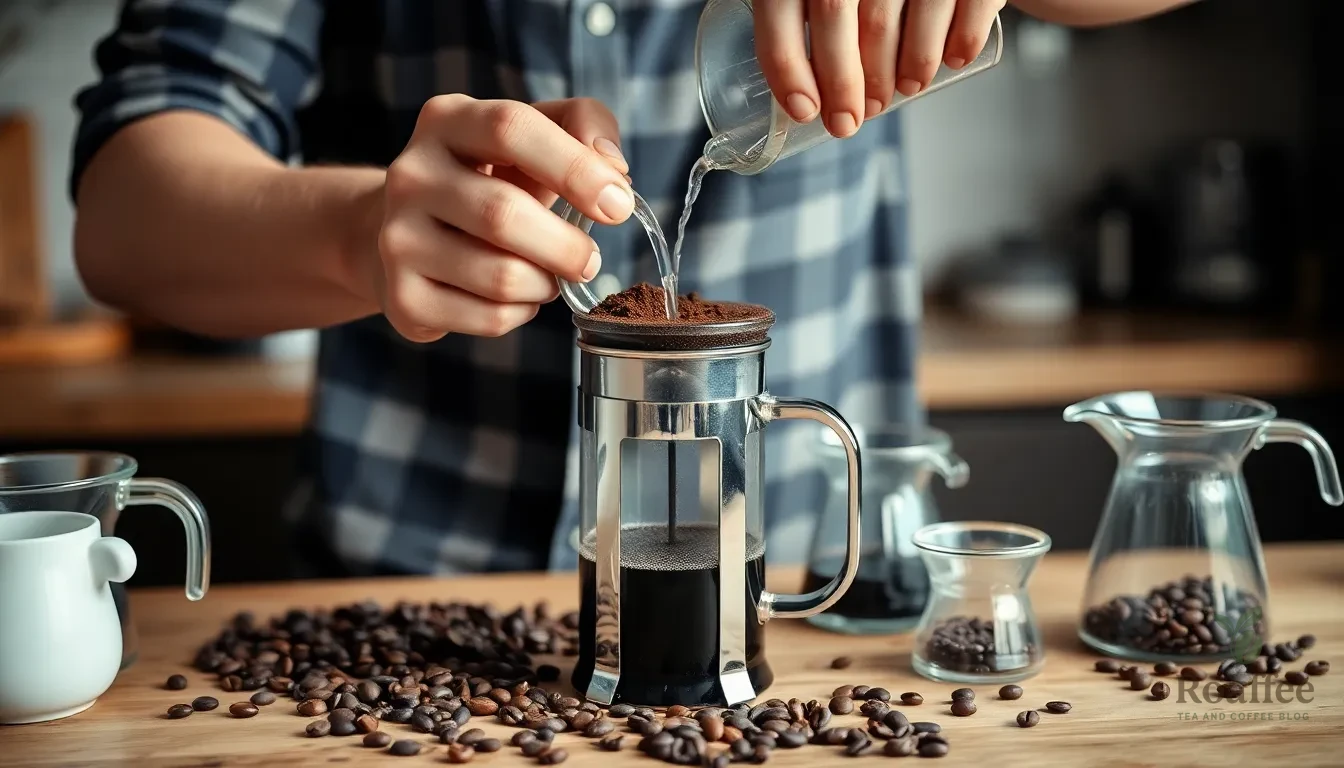
Creating exceptional French press coffee requires just a few simple ingredients that work together to deliver rich, full-bodied flavor in every cup.
Coffee Grounds
- 30 grams coarse-ground coffee (for 500 ml water)
- Choose a coarse grind to prevent over-extraction and ensure smooth pressing
- Fresh beans ground just before brewing deliver optimal flavor
Water
- 500 ml hot water (heated to 80-90°C / 180-194°F)
- Use filtered water for the cleanest taste
- Temperature range prevents scorching the coffee grounds
Coffee to Water Ratio Guidelines
| Measurement Method | Coffee Amount | Water Amount | Ratio |
|---|---|---|---|
| Weight (grams) | 30g | 500ml | 1:16 |
| Volume (tablespoons) | 2 tbsp | 8 oz (240ml) | 1:15 |
| Standard serving | 15g | 240ml | 1:16 |
Optional Flavor Enhancements
- Chocolate and hazelnut syrup for mocha variation
- Ground cinnamon and brown sugar mixed with grounds for spiced coffee
- Vanilla extract (2-3 drops) for subtle sweetness
We recommend starting with the basic coffee and water combination to master the fundamental technique before experimenting with flavor additions. The quality of your coffee beans significantly impacts the final result, so invest in freshly roasted beans from a reputable source for the best brewing experience.
Coffee to Water Ratio
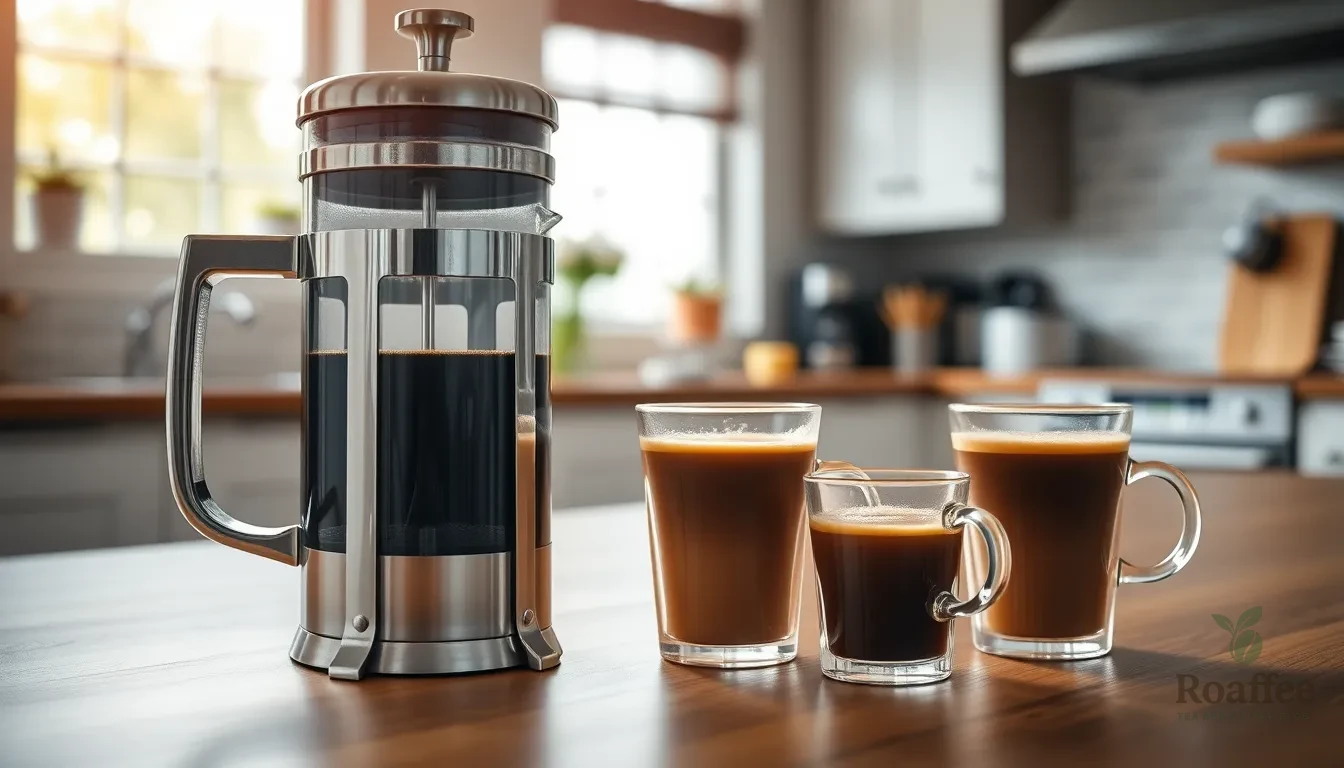
Getting the perfect coffee to water ratio forms the foundation of exceptional French press brewing. We recommend using a 1:15 coffee to water ratio by weight for optimal flavor extraction and strength.
Understanding these measurements helps us achieve consistent results every time:
| Water Amount | Coffee Beans Required |
|---|---|
| 1 cup (8 fl oz) | 2 tablespoons |
| 2 cups (16 fl oz) | 1/4 cup |
| 4 cups (32 fl oz) | 1/2 cup |
| 8 cups (64 fl oz) | 1 cup |
Weight measurements provide the most accurate results when brewing French press coffee. Using a digital scale ensures we maintain the proper 1:15 ratio regardless of bean density or grind variations.
Starting with this baseline ratio allows us to adjust strength according to personal preference. We can increase the coffee amount slightly for a bolder brew or reduce it for a milder taste.
The 1:15 ratio balances extraction efficiency with flavor development during the four-minute steeping process. This proportion ensures we extract the coffee’s essential oils and aromatics without overwhelming bitterness or weak flavor.
Measuring coffee beans before grinding maintains accuracy throughout the brewing process. We recommend keeping this ratio consistent while experimenting with grind size and steeping time for personalized results.
Instructions
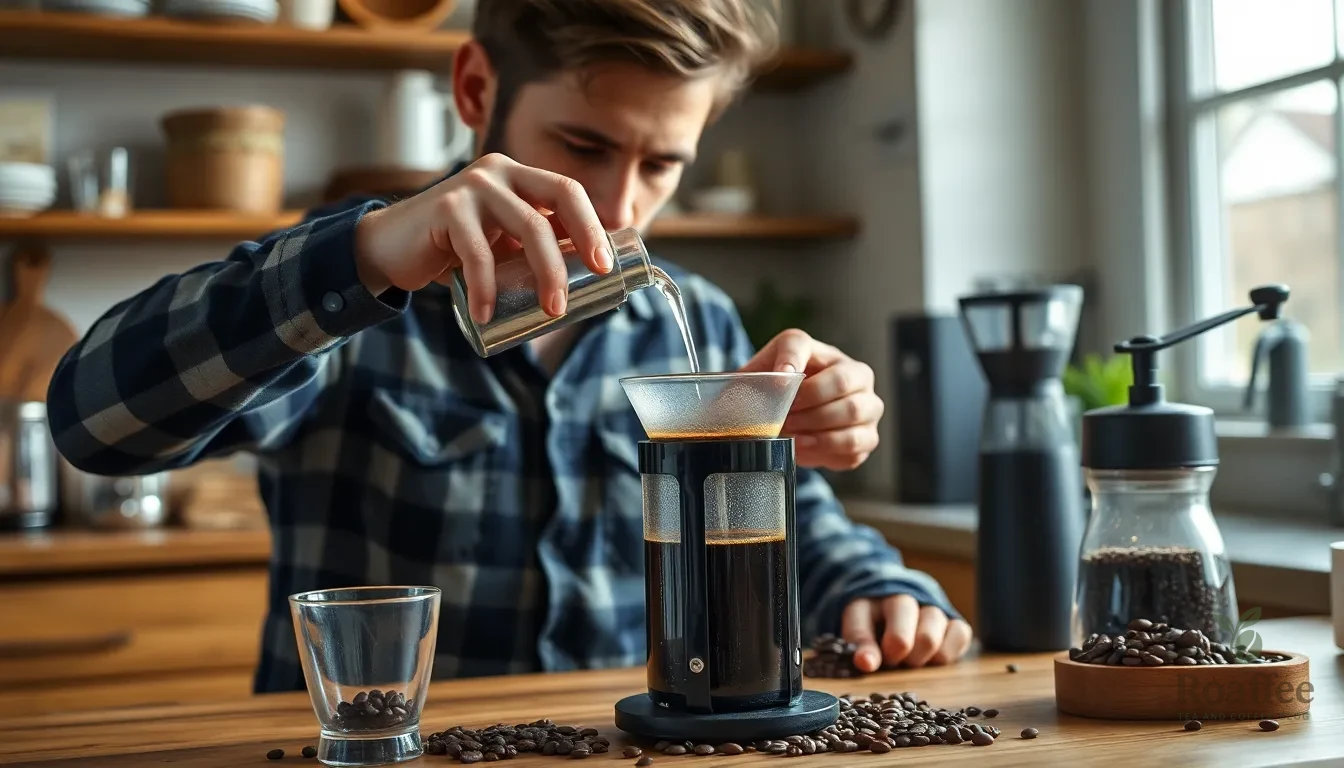
Now that we have our equipment ready and ingredients measured, let’s walk through the step-by-step process to brew exceptional French press coffee. These instructions will guide you through each critical phase of the brewing process.
Prep the Coffee Grounds
We start by measuring 56 grams of coffee beans, which equals approximately 8 tablespoons. Using our burr grinder, we grind the beans to a coarse consistency similar to breadcrumbs. This coarse grind prevents over-extraction and eliminates the bitterness that can occur with finer grounds. The coarse texture allows water to flow through the grounds properly during the steeping process while maintaining optimal extraction.
Heat the Water
Fresh water should be brought to a boil, then allowed to settle for about 30 seconds to reach the ideal temperature of 205°F (96°C). This temperature sits perfectly within our recommended range and ensures proper extraction without scorching the coffee grounds. We avoid using water that’s too hot, as it can create bitter flavors and damage the delicate coffee oils that give French press its distinctive character.
Add Coffee to French Press
We begin by warming our French press with hot water, swirling it around the interior before discarding this water completely. This step maintains the brewing temperature throughout the process and prevents heat loss during extraction. Next, we add our coarse coffee grounds to the warmed French press, creating an even layer across the bottom of the carafe.
Pour and Steep
Hot water is poured halfway over the coffee grounds first, covering approximately half the total water we’ll use. This “bloom” phase releases trapped gases and enhances the coffee’s aroma development. After waiting 30 seconds, we gently stir with a wooden spoon to break the crust that forms on top. We then pour the remaining hot water up to the top of the press, ensuring all grounds are saturated. The plunger lid is placed on the press without pressing down, and we allow the coffee to steep for exactly 4 minutes.
Press and Serve
After the 4-minute steeping period, we slowly and firmly press the plunger all the way down to separate the grounds from the liquid. This pressing motion should be steady and controlled to avoid agitating the grounds. We immediately pour the coffee into our mug or carafe to prevent over-extraction and maintain the optimal flavor profile. The French press should be cleaned by swirling some water with the remaining grounds before discarding them.
| Brewing Phase | Time Required | Temperature |
|---|---|---|
| Prep and Grind | 2 minutes | Room temperature |
| Water Heating | 3 minutes | 205°F (96°C) |
| Bloom Phase | 30 seconds | 205°F (96°C) |
| Steeping | 4 minutes | 205°F (96°C) |
| Total Time | 9 minutes | 205°F (96°C) |
Tips for Perfect French Press Coffee
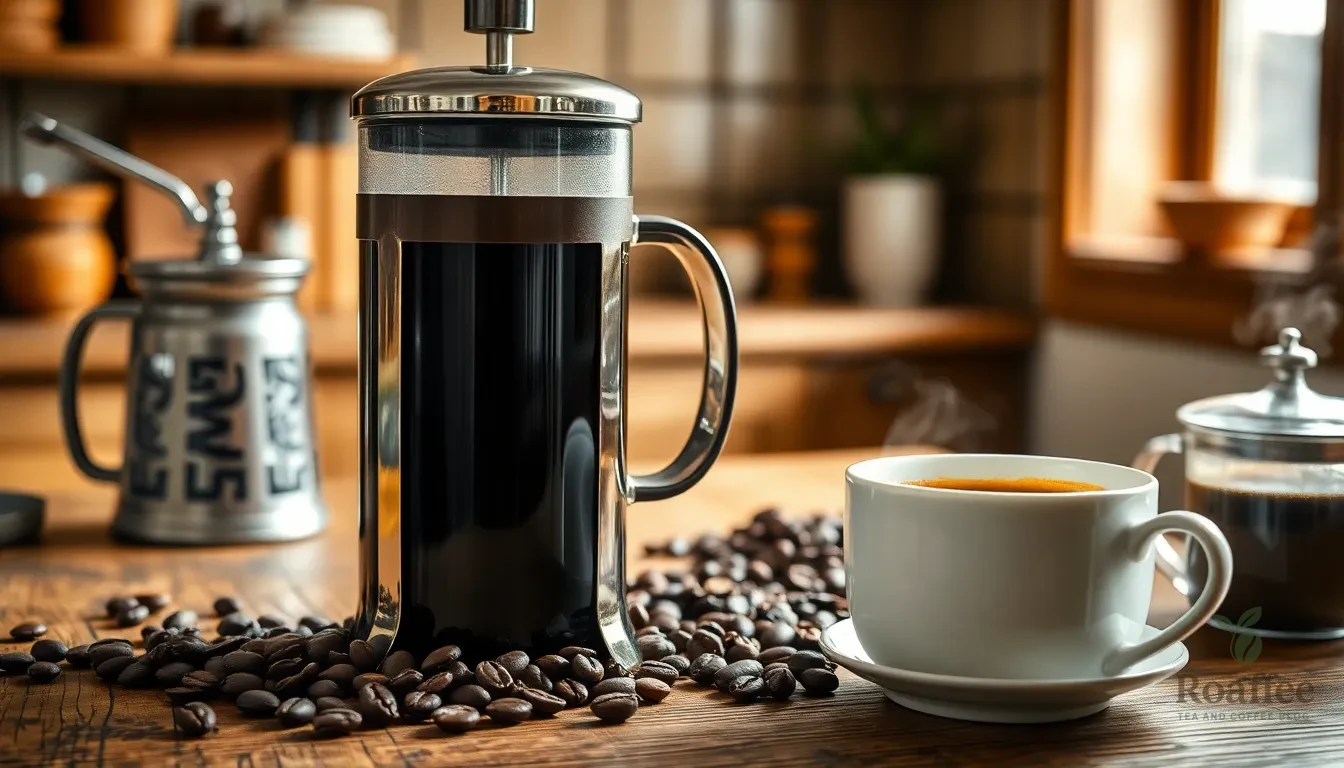
While we’ve covered the basic brewing process, mastering a few key techniques will elevate your French press coffee from good to exceptional. These expert tips focus on the crucial elements that make the biggest difference in your final cup.
Choosing the Right Coffee Beans
We recommend selecting medium to dark roasted beans for the most robust flavors that complement the French press method. These roasts stand up exceptionally well to the long immersion steeping process and deliver the full-bodied experience French press coffee is known for.
Single-origin beans offer distinct flavor profiles that can transform your morning routine. Colombian beans provide balanced body with smooth characteristics, while Brazilian varieties contribute nutty-chocolate undertones that pair beautifully with the French press extraction method. Ethiopian beans deliver wine-like complexity with bright acidity, and Guatemalan coffee adds subtle spice notes that enhance the overall brewing experience.
Fresh roasting makes a important difference in flavor quality. We suggest purchasing beans roasted within two weeks of your brewing date to ensure optimal flavor extraction and aroma retention.
Grinding Techniques
Coarse grinding remains the most critical factor for successful French press brewing. We grind our coffee to resemble the texture of sea salt or steel-cut oats, which prevents over-extraction and reduces excessive sediment in the final cup.
Fine or medium-fine grinds create multiple brewing problems that we want to avoid. These smaller particles lead to bitter, over-extracted coffee and can clog the metal filter, making the pressing process difficult and unpleasant.
Burr grinders produce the most consistent coarse grind size compared to blade grinders. We recommend grinding your beans immediately before brewing to preserve maximum flavor and aroma compounds.
Water Temperature Guidelines
Water temperature directly impacts extraction quality and overall flavor balance. We heat our water to approximately 200°F, which is just off the boiling point and ideal for most coffee types.
Dark roasted beans and decaf varieties benefit from slightly lower temperatures. We reduce the water temperature by 10-15°F for these coffees to prevent scorching and bitter flavors that can overwhelm the natural coffee characteristics.
Filtered water produces noticeably better results than tap water. We use filtered water to eliminate chlorine and other chemicals that can interfere with the coffee’s natural flavors and create off-tastes in the final brew.
Steeping Time Variations
The blooming process enhances flavor extraction and should not be skipped. We add just enough hot water to wet the coffee grounds and let them sit for 3-4 minutes, which allows carbon dioxide to escape and prepares the grounds for optimal extraction.
After blooming, we add the remaining water and steep for an additional 3-4 minutes before pressing the plunger down slowly and evenly. This controlled timing prevents over-extraction while ensuring full flavor development.
Total steeping time typically ranges from 4-6 minutes depending on your taste preferences. We use a timer to maintain consistency and adjust the steeping duration slightly based on the exact beans and desired strength level.
| Steeping Phase | Duration | Purpose |
|---|---|---|
| Bloom | 3-4 minutes | Release CO2 and prepare grounds |
| Full Steep | 3-4 minutes | Extract flavors and oils |
| Total Time | 4-6 minutes | Complete extraction process |
Troubleshooting Common Issues
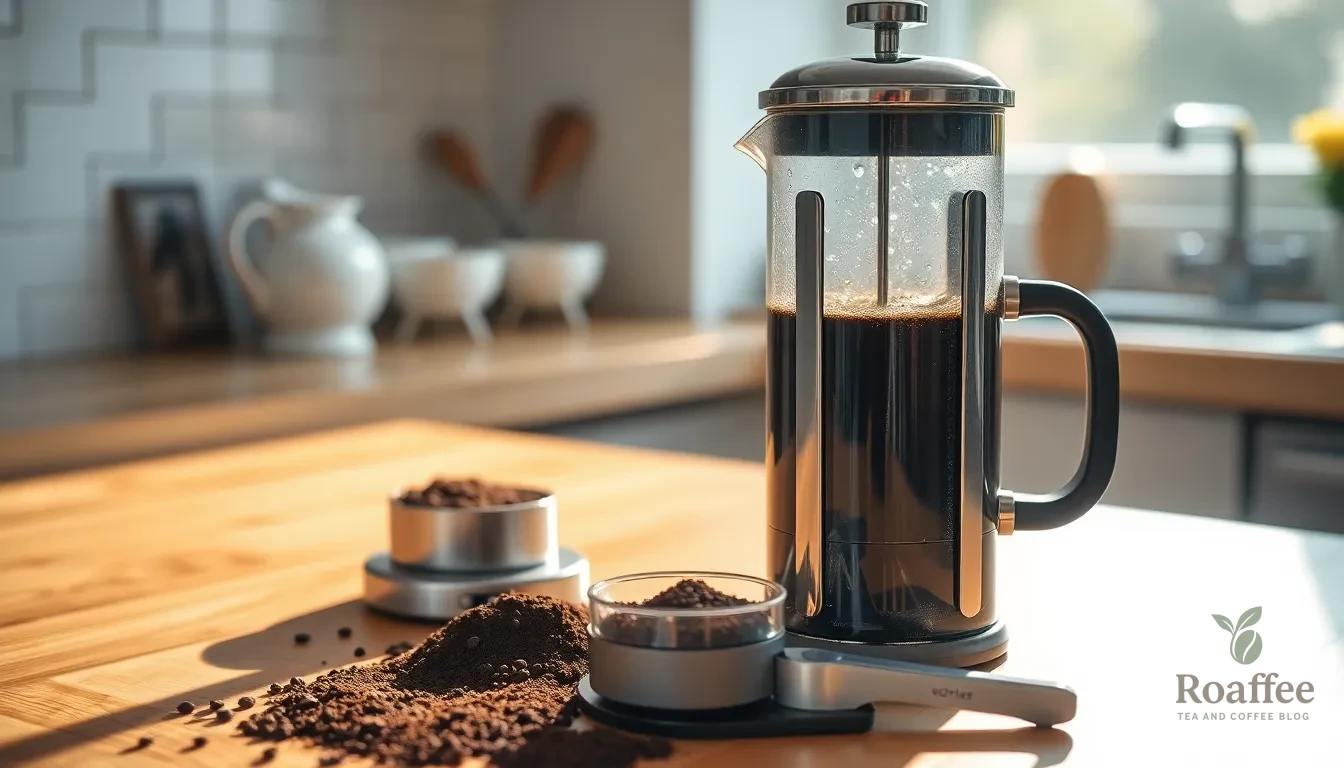
Even experienced coffee enthusiasts encounter challenges when brewing French press coffee. We’ve identified the most common problems and their answers to help you achieve consistent results every time.
Coffee Too Weak or Strong
The coffee-to-water ratio directly affects your brew’s strength and flavor intensity. When your coffee tastes weak, we recommend increasing the amount of coffee grounds rather than extending the brewing time. Start by adding an extra 5-10 grams of coffee to your standard 56-gram measurement for a stronger cup.
Conversely, if your coffee overwhelms your palate with excessive strength, reduce the coffee quantity by 5-10 grams while maintaining the same water volume. We’ve found that adjusting the coffee amount produces more predictable results than altering brewing time or water temperature.
| Problem | Cause | Solution |
|---|---|---|
| Coffee too weak | Insufficient coffee grounds | Increase coffee by 5-10g per 500ml water |
| Coffee too strong | Excessive coffee grounds | Decrease coffee by 5-10g per 500ml water |
Bitter or Sour Taste
Bitter coffee typically results from over-extraction caused by grinding beans too fine or steeping too long. We recommend adjusting your grind size to a coarser consistency resembling coarse salt or steel-cut oats. Also, reduce your brewing time from 4 minutes to 3 minutes if bitterness persists.
Sour coffee indicates under-extraction due to grounds that are too coarse or insufficient brewing time. Make your grind slightly finer while maintaining the coarse texture, and extend your steeping time to 5-6 minutes. Water temperature also plays a crucial role in extraction balance.
| Taste Problem | Cause | Solution |
|---|---|---|
| Bitter taste | Over-extraction from fine grind or long brew time | Use coarser grind, reduce brewing time |
| Sour taste | Under-extraction from coarse grind or short brew time | Use slightly finer grind, increase brewing time |
Sediment Problems
Excessive sediment in your cup usually stems from grinding coffee beans too fine for the French press method. We suggest adjusting your grinder to produce larger, more uniform particles that won’t pass through the metal filter. Check your grinder’s settings and aim for a consistency similar to coarse breadcrumbs.
Filter seal issues can also allow grounds to escape into your coffee. Inspect your French press plunger and filter assembly for damage or wear. Replace the filter if you notice cracks or warping that prevent proper sealing. Press down slowly and steadily to maintain proper filtration throughout the brewing process.
Storage and Maintenance
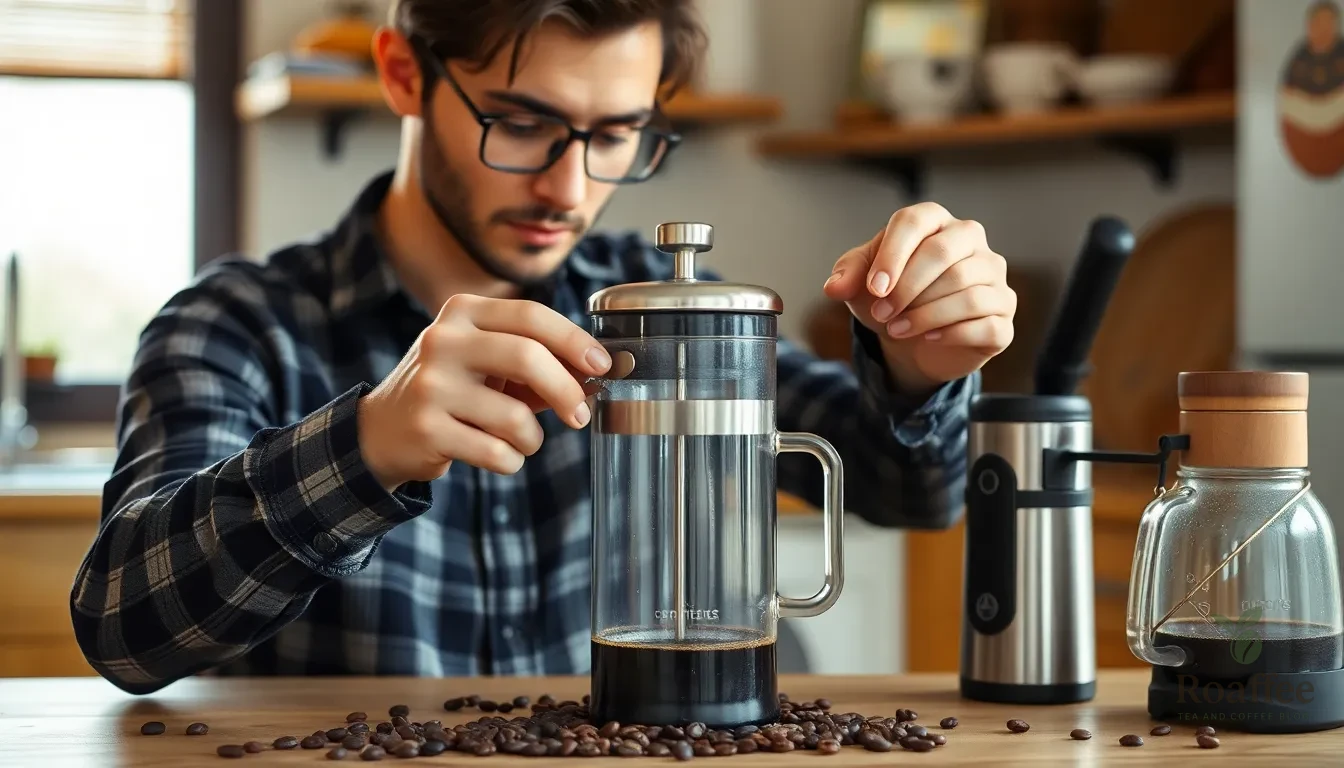
Proper storage and maintenance ensure your French press continues delivering exceptional coffee while extending its lifespan. We’ll guide you through essential cleaning techniques and storage methods to preserve both your equipment and coffee quality.
Cleaning Your French Press
Let the press cool completely before cleaning to prevent burns from hot glass or metal components. We recommend disposing of coffee grounds in the trash or compost bin rather than down the sink to avoid plumbing clogs.
Remove grounds using a wooden spoon or plastic spatula to protect the glass carafe from scratches. Rinse the press and filter assembly thoroughly with warm water and mild dish soap. A bottle brush or long-handled sponge works perfectly for reaching all interior surfaces.
For deep cleaning we suggest performing monthly maintenance using baking soda and vinegar. Fill the press halfway with warm water add two tablespoons of baking soda and let it sit for 15 minutes. Pour out the solution rinse thoroughly then add equal parts water and white vinegar. Allow this mixture to sit for another 15 minutes before rinsing completely.
Store your French press with the plunger raised and all components completely dry. This prevents odors and mold growth while maintaining the filter’s effectiveness for future brews.
Storing Leftover Coffee
Transfer any remaining coffee immediately to a thermal carafe or airtight container to preserve its flavor and prevent over-extraction. Leaving coffee in contact with grounds creates bitter compounds that compromise taste quality.
Store brewed coffee at room temperature for up to 4 hours or refrigerate for longer storage periods. We recommend consuming refrigerated coffee within 12 hours for optimal flavor retention.
Reheat leftover coffee gently using a microwave or stovetop method rather than brewing fresh hot water through the grounds. Never reheat coffee directly in the French press as this can damage the glass and create uneven heating.
| Storage Method | Duration | Temperature | Quality Notes |
|---|---|---|---|
| Room Temperature | 4 hours | 68-72°F | Best flavor retention |
| Refrigerated | 12 hours | 35-40°F | Acceptable quality |
| Thermal Carafe | 6 hours | 140-160°F | Maintains warmth |
Conclusion
Mastering the French press isn’t just about following a recipe—it’s about understanding the fundamentals that transform ordinary coffee beans into an extraordinary daily ritual. We’ve covered everything from equipment selection to troubleshooting common issues that can derail your perfect cup.
The beauty of French press coffee lies in its simplicity and the control it gives you over every variable. Whether you’re adjusting your grind size experimenting with different bean origins or fine-tuning your steeping time each brew becomes an opportunity to refine your technique.
With proper maintenance and storage practices your French press will serve you well for years to come. Remember that consistency comes with practice so don’t be discouraged if your first few attempts aren’t perfect. Keep experimenting with ratios and timing until you discover your ideal brew.
Now it’s time to put these techniques into action and start enjoying café-quality coffee from the comfort of your own kitchen.
Frequently Asked Questions
What is the ideal coffee-to-water ratio for French press?
The recommended ratio is 1:15 by weight, meaning 1 gram of coffee for every 15 grams of water. For example, use 30 grams of coarse-ground coffee for 500ml of water. This ratio ensures optimal flavor extraction and strength without bitterness during the 4-minute steeping process.
How long should I steep French press coffee?
Steep your French press coffee for 4-6 minutes total. This includes a 30-second “bloom” phase where you pour a small amount of hot water over the grounds, followed by 4 minutes of full steeping. This timing allows for complete flavor extraction without over-extraction.
What water temperature is best for French press coffee?
Heat your water to 200-205°F (93-96°C). This temperature is hot enough to extract the coffee’s full flavor without scorching the grounds. If you don’t have a thermometer, let boiling water sit for 30 seconds before pouring.
What grind size should I use for French press?
Use a coarse grind consistency, similar to sea salt or breadcrumbs. Coarse grounds prevent over-extraction and reduce sediment in your cup. A burr grinder is recommended for consistent particle size, which ensures even extraction throughout the brewing process.
How do I fix bitter French press coffee?
Bitter coffee typically results from over-extraction. Try using a coarser grind, reducing steeping time to 3-4 minutes, or lowering water temperature to 195°F. You can also reduce the coffee-to-water ratio slightly to achieve a milder taste.
Why is my French press coffee weak?
Weak coffee usually indicates under-extraction. Increase your coffee-to-water ratio, use a slightly finer grind, or extend steeping time to 5-6 minutes. Ensure your water temperature is hot enough (200-205°F) and that you’re using freshly ground beans.
How do I clean my French press properly?
Let the press cool completely, then remove grounds with a wooden spoon. Rinse with warm water and mild dish soap. For monthly deep cleaning, use a mixture of baking soda and vinegar. Always dry components thoroughly before storage.
Can I reheat French press coffee?
While you can reheat French press coffee, it’s best consumed fresh. If you must store it, transfer to a thermal carafe or airtight container immediately after brewing. Refrigerated coffee stays fresh for up to 24 hours, but reheating may affect taste quality.
What type of coffee beans work best for French press?
Medium to dark roasted beans work excellently for French press, providing robust flavors that complement the brewing method. Single-origin varieties offer distinct flavor profiles. Always use freshly roasted beans (within 2-4 weeks of roast date) for optimal taste.
How much coffee does a French press make?
French press sizes vary, typically ranging from 12-34 ounces. A standard 8-cup French press makes about 32 ounces of coffee. Choose your size based on household needs, keeping in mind that French press coffee is best consumed immediately after brewing.
